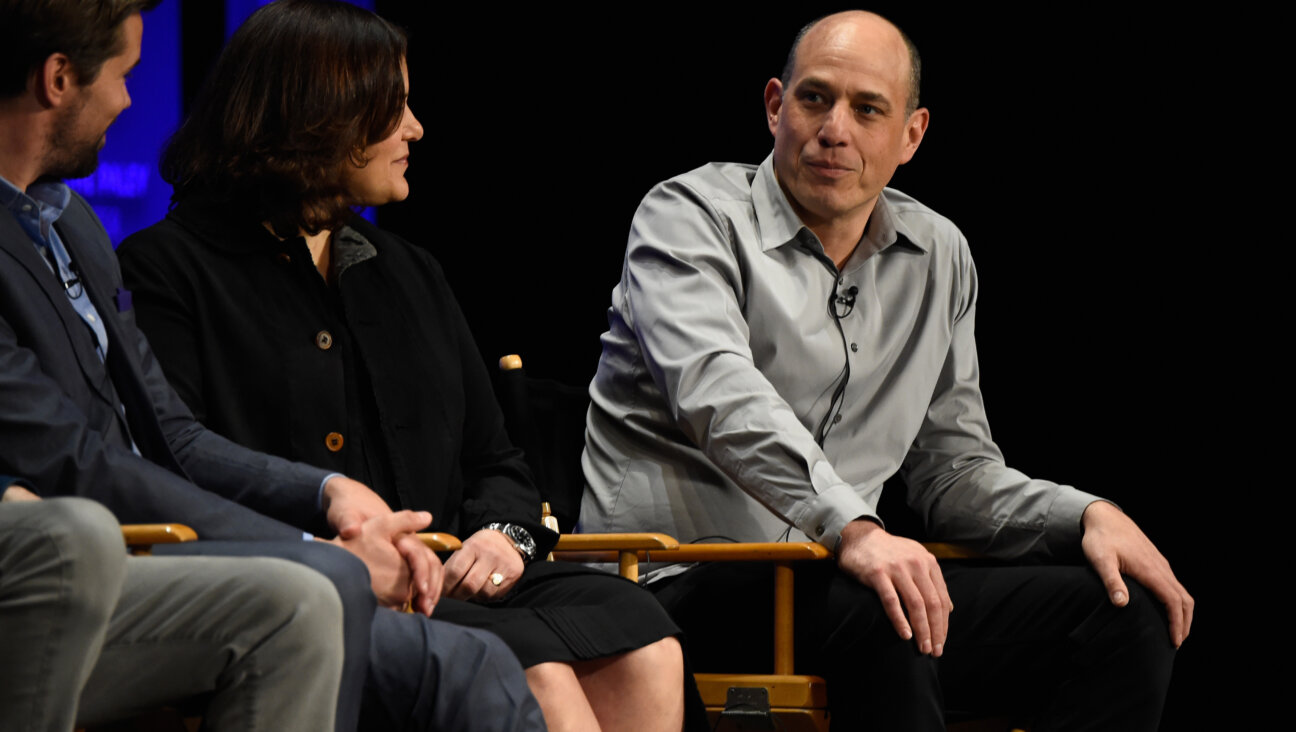Doubling Dutch

Image by Jan Victors, Wiki Commons
Native Dutch speaker Gerda Elata-Alster writes in response to my column on “shtick,” which spoke of Yiddish words in American English sometimes taking on — or, as I put it, “intermarrying with” — non-Jewish meanings:
“Many Yiddish words have been integrated into Dutch, too, although I can’t remember any ‘intermarriages.’ Unfortunately, many of these words are related to the world of petty crime or money, such as ganov, thief; bayis, prison, and meyer, a hundred guilden [from the Hebrew words ganav, “thief”; bayit, “house,” and me’ah, “hundred”]. But there is also Mokum [from Hebrew makom, “place”], referring to Amsterdam, sometimes also called Mokum Olef.”

Trading Tongues: Merchant Jews found a welcoming home in Mokum Olef, otherwise known as Amsterdam. Image by Ludolf Backhuysen, wiki commons
Given the fact that, as elsewhere in Europe, Jewish-Christian relations in pre-modern Dutch society were closest in the sphere of commerce, both legal and illegal, it’s not surprising that the words Dutch picked up from the now extinct language of Western European Yiddish were weighted in that direction. If there was a difference between Holland and most other European countries, it was in the unusually large number of such words, a tribute to Holland’s traditional openness to its Jews. This was especially true of Amsterdam, whose local slang, known as Bargoens, has a significant Yiddish vocabulary. (Mokum Olef, “The ‘A’ Place,” derives, incidentally, not from Alef in the sense of No. 1, but from the initial Hebrew letter of “Amsterdam,” just as Berlin was known to Dutch-Jewish merchants as Mokum Beys, Delft as Mokum Dollet, Rotterdam as Mokum Reysh and so on.)
Many Western Yiddish words in Bargoens have retained their original sound and meaning, just as Ms. Elata-Alster says. Besides the examples she gives, one can point to words like dalles, poverty (from Hebrew dalut); kelole, curse (from Hebrew k’lalah); goochem (with the “g” pronounced like the “ch” in Bach), smart or cunning (from Hebrew ḥakham); jouker (with the “j” pronounced like a “y”), expensive (from Hebrew yakar), and many others.
Dutch did not change such words, even if it stripped them of their specific Jewish coloring. An interesting example of such stripping is asjewijne (pronounced “ah-sheh-vie-neh”). An asjewijne in Bargoens (the word also has the form kassiewijne) is something that has either been stolen or come upon by a lucky finder who gets to keep it, and the word comes from the Hebrew verb-plus-enclitic-pronoun hashiveynu, “return us,” or, “bring us back.” To those of you who are synagogue goers, this will, of course, ring a bell. The verse “Hashiveynu adonai elekha v’nashuva, ḥadesh yameynu k’kedem,” “Bring us back to You O Lord and we will return, restore us to the days that were,” is recited when the Torah scroll is returned to the Ark after congregants have read from it. A hashiveyni, a “return-me,” was in Western Yiddish a humorous term for an object whose owner wanted it back — yet the joke was lost in Bargoens, whose non-Jewish speakers could have had no idea of it.
Other Western Yiddish words in Bargoens were given new pronunciations by their non-Jewish Dutch users. Thus, Yiddish koten, child (from Hebrew katan, “small” or “little one”), became Amsterdam-Dutch koter; Yiddish pischon-peh, an excuse or alibi (from Hebrew pit’ḥn-peh), became biskopetjes; Yiddish chavrusa, company or companionship (from Aramaic ḥavruta), became gebroeze; Yiddish mesholemen, to pay (from Hebrew meshalem), became besollemen; Yiddish balabos, household head or boss (from Hebrew ba’al ha-bayit), became bollebof. Although their meanings remained the same, the Yiddish origins of such words were effectively effaced. No one could possibly guess just from hearing it or looking at it on a page that a word like biskopetjes had Jewish roots.
Moreover, numerous Yiddish words in Bargoens changed both sound and meaning. Take, for instance, mazzemate, which goes back to Hebrew masa u’matan. Yet whereas in Hebrew and Yiddish alike, masa u’matan means “negotiations,” mazzemate in Dutch means “stolen merchandise,” presumably because of the bargaining that took place between fences and thieves over the price of pilfered property.
Or take oddenommele, which, followed by an exclamation point, is a mild expletive or expression of surprise in Bargoens. Nothing about it indicates its Jewishness, but if one looks at other forms of it — for example, attenoje! oddeleheinu! or ottelenojeheine! — one sees that it derives from the formula adonai eloheynu, “O Lord our God,” in the Hebrew prayer book.
And sometimes, although the Jewish origin of a Bargoens word is clear, why the word means what it does is not. Kufnoen, for example, which signifies a complimentary ticket to a play or concert in Amsterdamese, clearly comes from the Hebrew letters kuf and nun, just as other Bargoens words derive from other letters of the Hebrew alphabet. (A heitje, for instance, from the Hebrew letter heh, whose numerical value is five, is a 5-guilden coin; a joetje is a 10-guilden one.) But what do kuf, whose value is 100, and nun, whose value is 50, stand for here? The theory that it’s Dutch kost niks, “costs nothing,” strikes me as far-fetched; an alternate explanation that the reference is to the 150th Psalm, which speaks of praising God with musical instruments, seems even more so. Had the editors of my Bargoens Woordenboek asked me, I would have pointed to the rabbinic expression “to rule a bug kosher for kuf-nun [150] reasons,” that is, to find endless rationalizations for something, which is to say, to give it a free pass. Alas, they didn’t.
Questions for Philologos can be sent to [email protected]
The Forward is free to read, but it isn’t free to produce

I hope you appreciated this article. Before you go, I’d like to ask you to please support the Forward.
Now more than ever, American Jews need independent news they can trust, with reporting driven by truth, not ideology. We serve you, not any ideological agenda.
At a time when other newsrooms are closing or cutting back, the Forward has removed its paywall and invested additional resources to report on the ground from Israel and around the U.S. on the impact of the war, rising antisemitism and polarized discourse.
This is a great time to support independent Jewish journalism you rely on. Make a gift today!
— Rachel Fishman Feddersen, Publisher and CEO
Support our mission to tell the Jewish story fully and fairly.
Most Popular
- 1

Culture Cardinals are Catholic, not Jewish — so why do they all wear yarmulkes?
- 2

Fast Forward Ye debuts ‘Heil Hitler’ music video that includes a sample of a Hitler speech
- 3

News School Israel trip turns ‘terrifying’ for LA students attacked by Israeli teens
- 4

Fast Forward Student suspended for ‘F— the Jews’ video defends himself on antisemitic podcast
In Case You Missed It
-

Yiddish קאָנצערט לכּבֿוד דעם ייִדישן שרײַבער און רעדאַקטאָר באָריס סאַנדלערConcert honoring Yiddish writer and editor Boris Sandler
דער בעל־שׂימחה האָט יאָרן לאַנג געדינט ווי דער רעדאַקטאָר פֿונעם ייִדישן פֿאָרווערטס.
-

Fast Forward Trump’s new pick for surgeon general blames the Nazis for pesticides on our food
-

Fast Forward Jewish feud over Trump escalates with open letter in The New York Times
-

Fast Forward First American pope, Leo XIV, studied under a leader in Jewish-Catholic relations
-
Shop the Forward Store
100% of profits support our journalism
Republish This Story
Please read before republishing
We’re happy to make this story available to republish for free, unless it originated with JTA, Haaretz or another publication (as indicated on the article) and as long as you follow our guidelines.
You must comply with the following:
- Credit the Forward
- Retain our pixel
- Preserve our canonical link in Google search
- Add a noindex tag in Google search
See our full guidelines for more information, and this guide for detail about canonical URLs.
To republish, copy the HTML by clicking on the yellow button to the right; it includes our tracking pixel, all paragraph styles and hyperlinks, the author byline and credit to the Forward. It does not include images; to avoid copyright violations, you must add them manually, following our guidelines. Please email us at [email protected], subject line “republish,” with any questions or to let us know what stories you’re picking up.















